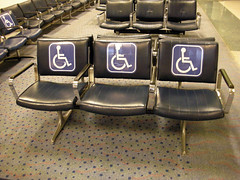 More and more people with disabilities are traveling these days, because there are adequate handicap facilities in many countries around the world. Most airports have the necessary facilities to enable disabled people and their families to travel with minimal hassle. Similar to ordinary travelers, people with disabilities may also meet with misfortunes while there are traveling, and they may end up needing medical care and emergency services. To ensure that they get adequate financial protection during their travels, disabled travelers should purchase a good travel insurance policy.
More and more people with disabilities are traveling these days, because there are adequate handicap facilities in many countries around the world. Most airports have the necessary facilities to enable disabled people and their families to travel with minimal hassle. Similar to ordinary travelers, people with disabilities may also meet with misfortunes while there are traveling, and they may end up needing medical care and emergency services. To ensure that they get adequate financial protection during their travels, disabled travelers should purchase a good travel insurance policy.
Not every insurance provider offers travel insurance policies for disabled people. Disabled travelers are required to purchase policies that provide special coverage for them. All the coverage that are available to ordinary travelers are included in a travel policy for the disabled, and these include emergency medical services and transportation, cancellation and curtailment, loss of luggage and belongings, personal liability, death and dismemberment, and others. On top of these, disabled travel insurance also covers for loss or damage of disability and mobility equipment, hire of disability and mobility equipment, and replacement of essential medication. Some insurance providers also offer insurance for care givers. If policy-holders are not satisfied with the amounts of compensation that are offered with certain coverage, they can pay extra to upgrade coverage of their choice. Disabled travel insurance policies are more expensive than policies for ordinary people, because they include a number of additional coverage.
Disabled travelers can opt for a single trip travel insurance policy or a multi trip travel insurance policy. A single trip policy provides coverage for the entire duration of a trip, and it cannot be used again after the trip. This type of policy is the most affordable, and it is suitable for people who do not travel frequently. Those who are planning to travel more than two times a year should get a multi trip policy, because it is cheaper than the total cost of two or more single trip policies. With a multi trip policy, travelers will be covered for any number of trips they make within a year.
It is advisable that disabled travelers purchase travel insurance from established insurance companies or specialized disabled travel insurance providers. Such providers will suggest the right coverage for disabled travelers after thorough evaluation of their physical conditions, and they have the experience and commitment to provide excellent emergency services. Also, they provide efficient claims services, which make it easier for policy holders to get financial recovery.





